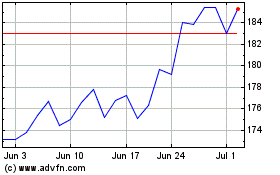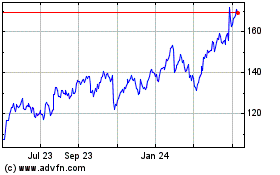Google Antitrust Suit Looms Over Issues of Search Dominance, Advertising
September 24 2020 - 8:17AM
Dow Jones News
By John D. McKinnon and Brent Kendall
WASHINGTON -- State attorneys general are expected to meet with
top Justice Department officials on Thursday to discuss how -- and
how quickly -- they should pursue an antitrust case against
Alphabet Inc.'s Google that could reshape the online business
environment.
Top Justice Department officials including Attorney General
William Barr want to move swiftly in filing the case, The Wall
Street Journal has reported. But wrangling with state officials
amid a charged partisan political atmosphere could complicate the
process somewhat, some people said.
Google declined to comment on the DOJ meeting with attorneys
general. In a blog post on competition issues, it has emphasized
that its products help people as well as other businesses. "Our
products increase choice and expand competition," it said. "They
level the playing field for small businesses everywhere -- enabling
them to sell their products, find customers, reduce their costs
and, in difficult times, get back on their feet."
Google has been investigated by federal and state authorities
over a range of potential antitrust issues, including whether it
has abused its dominance in internet searches as well as online
advertising.
The department has been moving toward bringing a lawsuit before
the election, the Journal has reported. Dozens of government
antitrust lawyers have been investigating whether the search giant
has used its dominance to stifle competition.
One group of DOJ investigators is focused on Google's search
practices. Another team is examining Google's online advertising
business, where the company owns industry-leading tools at every
link in the complex chain between online publishers and
advertisers.
The department's search investigation has been moving more
rapidly and will likely be the key focus of a lawsuit that could
come within days, according to people familiar with the matter.
Allegations related to Google's ad business, which also are a big
focus of state investigators, could come later, the people
said.
Around 50 attorneys general, including members of both parties,
said they were joining in the states' antitrust investigation of
the company last year. That bipartisan coalition has been
cooperating closely with the Justice Department.
Recently, however, partisan fractures have begun to surface
among the states and between state officials and their federal
counterparts. Some Democratic attorneys general have been prominent
among those raising concerns with their colleagues about whether
the Justice Department case is moving too fast or doesn't include
enough issues, according to several people familiar with the
matter. Some have been urging their colleagues not to join in the
case, these people say.
The presidential election could be adding political
considerations to the mix, according to some people familiar with
the matter.
Others say those divisions are being exaggerated. Jim Hood, the
former Democratic attorney general of Mississippi, who has been a
critic of Google, said in an interview this week that he believes
the bipartisan coalition of state attorneys general that has
emerged will generally hold together, despite the growing political
pressures of election season.
"I've found that attorneys general set that [partisanship]
aside," Mr. Hood said. "In the end I think that's how this will
happen. I don't see that partisan divide."
Arizona's attorney general, Mark Brnovich, a Republican, said:
"The reality is this shouldn't be an issue of right versus left,
because it's a fundamental issue of right versus wrong."
Google has been under the antitrust microscope for a decade. The
Federal Trade Commission, which shares antitrust authority with the
Justice Department, spent more than a year investigating Google but
decided in 2013 not to bring a case. Some FTC staffers in that case
raised several concerns about Google's conduct, but the commission
said the evidence, on balance, didn't warrant a case.
While the U.S. hasn't taken action, antitrust enforcers in the
European Union have brought three cases against Google, with fines
totaling more than $9 billion.
The company also has been criticized by both parties on Capitol
Hill, including during a July 29 hearing in which Google Chief
Executive Sundar Pichai and other top tech CEOs testified.
While lawmakers from both sides of the aisle have denounced
Google for having too much power online, Republicans have a longer
list of grievances, some of which go beyond concerns about
competition and are focused instead on allegations the company is
biased against conservatives. Democrats, including presidential
nominee and former Vice President Joe Biden, say platforms need to
do more to curb the spread of false information.
Separately on Wednesday, the Justice Department submitted a
proposal to Congress to curb longstanding legal protections for
internet companies such as Facebook Inc., Google and Twitter Inc.
and force them to shoulder more responsibility for managing content
on their sites.
Write to John D. McKinnon at john.mckinnon@wsj.com and Brent
Kendall at brent.kendall@wsj.com
(END) Dow Jones Newswires
September 24, 2020 08:02 ET (12:02 GMT)
Copyright (c) 2020 Dow Jones & Company, Inc.
Alphabet (NASDAQ:GOOGL)
Historical Stock Chart
From Mar 2024 to Apr 2024

Alphabet (NASDAQ:GOOGL)
Historical Stock Chart
From Apr 2023 to Apr 2024
